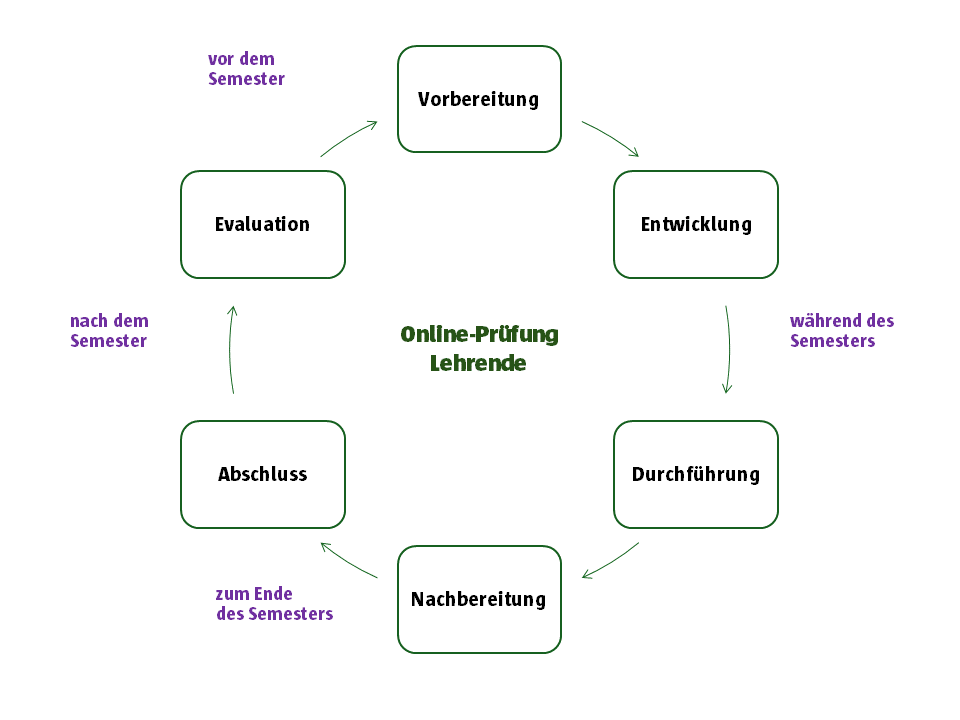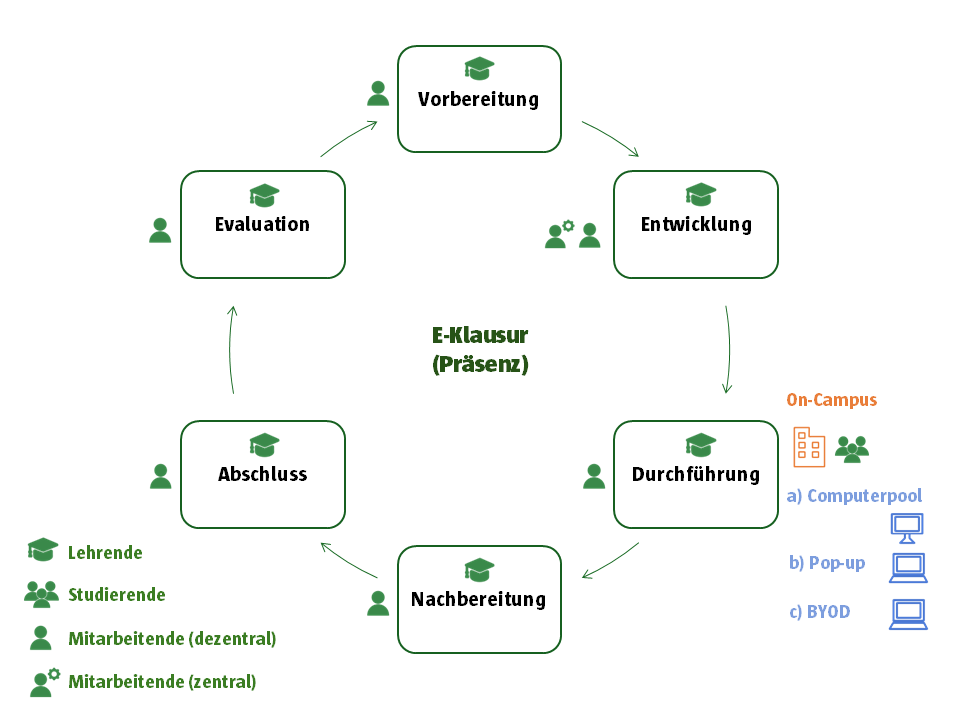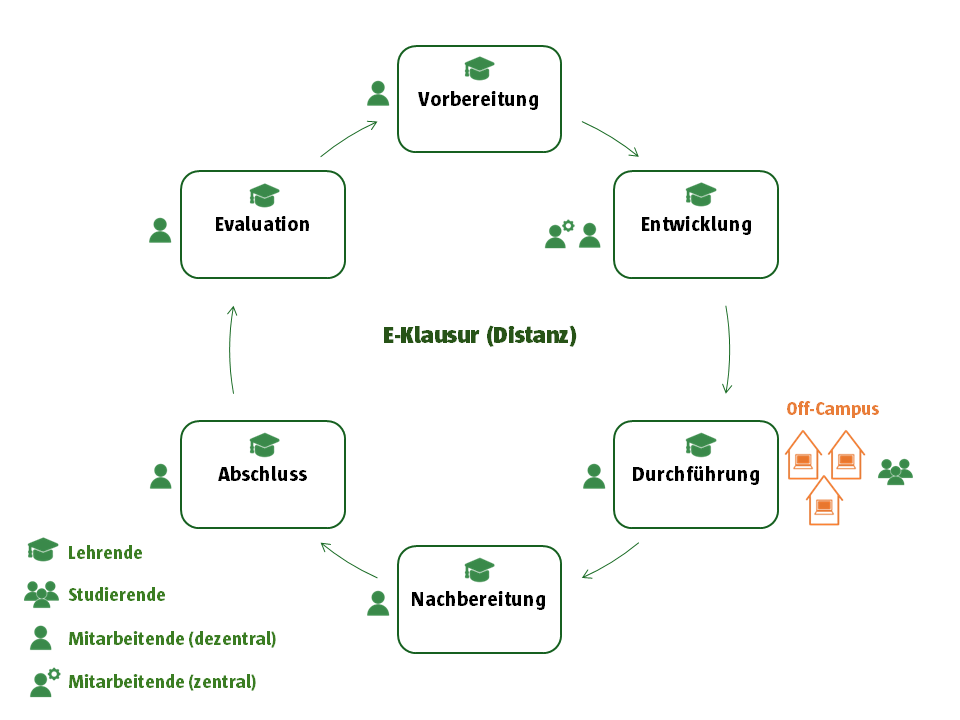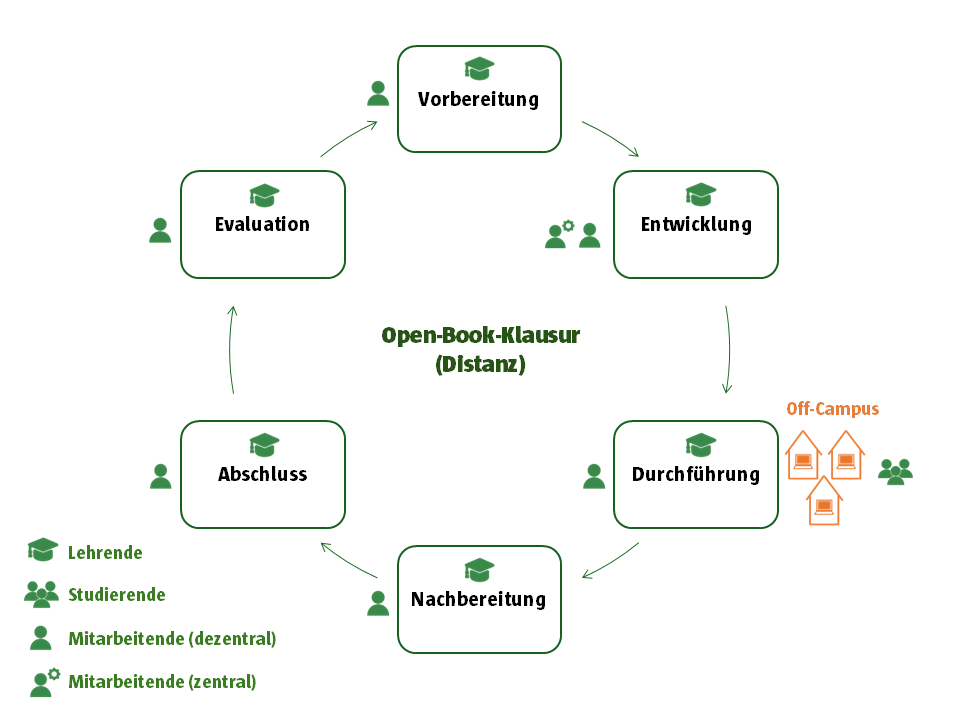Didactic Scenarios and Forms of Online Examinations
As a lecturer, you must first decide on an online examination scenario. This thematic dossier will help you with your decision and provide further tips. At the end, you will also find a series of good practice examples of online exams that your colleagues at the University of Applied Sciences Potsdam have already successfully implemented.
Didactic scenarios and forms for online exams
There are three standardised online examination scenarios and forms, which are also anchored in the framework regulations for studies and examinations at the University of Applied Sciences Potsdam. Various online examination forms are presented in more detail below. The criteria and categories are based on the general categories for examinations by Gabi Reinmann (May 2014): "Prüfungen – einfach in der Kategorisierung – komplex in der Ausgestaltung".

E-exam (presence)
Profile
- Examination form: Written examination
- Examination mode: written from the student perspective, examiners in a reading role, "written work" as the subject of the examination
- Examination scenario: with on-site presence, examination supervision, scheduled time and place, virtual, students on-campus, lecturers on-campus, synchronous, centralised
- Social form: usually individual
- Resources: usually closed book, i.e. no external resources may be used
- Medium: Moodle Exam (Moodle Tests), internet, computer/laptop, video camera, mobile phones if necessary, students on campus (computer pool, pop-up, BYOD), lecturers off or on campus (service devices)
- Purpose: knowledge recognition, reproduction, application, etc.
- Context: usually based on lecture/seminar, Moodle online course and literature
Course description
E-exams are summative examinations at the end of the semester. They are completed by students individually under the supervision of the lecturer. For the e-examination in presence, the lecturers and students are in the same place. Students participate individually on computers with an internet connection using the Moodle learning management system. The online exam usually takes place in a computer pool at the university. In exceptional cases, university laptops (pop-up) or student laptops (BYOD) can also be used. However, there are fewer control options here. The lecturers supervise the students on site. The creation, management and evaluation is done via Moodle. As a rule, the "Test" activity is used for this. However, grades are not assessed and announced via Moodle, but via the online student self-administration portal MyCampus.
Examination didactics
E-exams generally use closed question types that can be analysed automatically. Some open text tasks can also be created, possibly with text restrictions, which must be analysed individually and manually. E-exams usually take place in closed-book format, without any aids. Sometimes e-exams also take place in open-book format, with aids. They are then referred to as "e-exams (face-to-face) in open-book format".
- Here you can find out which didactic question types are available for the test activity.
- Here you can find out how to organise an online exam using the Moodle exam platform.
Legal framework conditions
The use of this form of online examination is regulated by the framework and examination regulations of the University of Applied Sciences Potsdam.

E-exam (distance)
Profile
- Type of examination: Written exam
- Examination mode: written from the student's perspective, examiners in a reading role, "written work" as the subject of the examination
- Examination scenario: virtual presence, with online conference system Zoom for video supervision, examination fixed time and place, virtual, students off-campus, lecturers off- or on-campus, synchronous, centralised
- Social form: usually individual
- Resources: usually closed book, i.e. no external resources may be used
- Medium: Moodle Exam (Moodle Test), internet, computer/laptop, video camera, possibly mobile phones, students usually off-campus (BYOD), lecturers off- or on-campus (service devices)
- Purpose: performance assessment, testing of large cohorts, knowledge recognition, reproduction, application, testing of basic knowledge
- Context: usually based on lecture/seminar, Moodle online course and literature
Course description
E-exams are summative examinations at the end of the semester. They are completed by students individually under the supervision of the lecturer. In the e-examination at a distance, the lecturers and students are in different locations. Students usually take part from home using their own computers with an internet connection with the help of the Moodle learning management system. Teachers are also at home or on campus. They supervise the students via a video conferencing system on a computer with an internet connection. Teachers therefore need a video camera and ideally a headset. Students also need a video camera and ideally a headset to take the online exam. At present, this form of online examination is not recommended due to the increased possibility of technical cheating. The creation, management and evaluation are carried out via Moodle. As a rule, the "Test" activity is used for this purpose. However, grades are not assessed and announced via Moodle, but via the online student self-administration portal MyCampus.
Examination didactics
E-exams generally use closed question types that can be analysed automatically. Some open text tasks can also be created, possibly with text restrictions, which must be analysed individually and manually. E-exams usually take place in closed-book format, without any aids. Sometimes e-exams also take place in open-book format, with aids, in which case the format is referred to as "e-exam (distance) in open-book format".
- Here you can find out which didactic question types are available for the test activity.
- Here you can find out how to organise an online exam using the Moodle exam platform.
Legal framework conditions
The use of this form of online examination is regulated by the framework and examination regulations of the University of Applied Sciences Potsdam.

Open book exam (distance)
Profile
- Type of examination: Written exam
- Examination mode: written from the student's perspective, examiners in a reading role, "written work" as the subject of the examination
- Examination scenario: in virtual presence, with online conferencing system Zoom for video supervision, examination fixed time and place, students off-campus, lecturers off- or on-campus, synchronous, centralised
- Social form: usually individual
- Resources: Open book, i.e. external resources can also be used
- Medium: Moodle Exam (Moodle delivery), internet, computer/laptop, video camera, mobile phones if necessary, students usually off-campus (BYOD), lecturers off- or on-campus (service devices)
- Purpose: knowledge recognition, reproduction, application, problem-solving skills, etc.
- Context: usually based on lecture/seminar, Moodle online course and literature
Description
Open-book exams are summative examinations at the end of the semester. They are completed by students individually under the supervision of the lecturer. In the open-book exam at a distance, the lecturers and students are in different locations. Students usually take part from home using their own computers with an internet connection with the help of the Moodle learning management system. Lecturers are also at home or on campus. They supervise the students via a video conferencing system on a computer with an internet connection. Lecturers therefore need a video camera and ideally a headset. Students also need a video camera and ideally a headset to take part in the online examination. Students are usually given a task that they can work on using a local programme on their computer. Students then upload the results back to Moodle. It is recommended to test in advance whether the students can read and edit the lecturer's files. Lecturers should also check in advance whether they can analyse the students' edited files. The creation and management is done via Moodle. The evaluation is done individually and manually. As a rule, the "Assignment" activity in Moodle is used for this purpose. However, grades are not assessed and announced via Moodle, but via the online student self-administration portal MyCampus.
Examination didactics
Students sometimes underestimate open-book exams. The open questions require students to work independently. Lecturers should specify in the declaration of independence for online examinations which aids may be used and according to which rules. Sometimes open-book examinations take place in a room under the supervision of the lecturer. These are then called open-book exams (face-to-face).
Sometimes e-exams also take place in open-book format, with aids, in which case the format is called "e-exam (distance/presence) in open-book format". These types of exams are considered e-exams and not open-book exams.
Legal framework conditions
The use of this online examination format is regulated by the framework and examination regulations of the University of Applied Sciences Potsdam.

Contact
